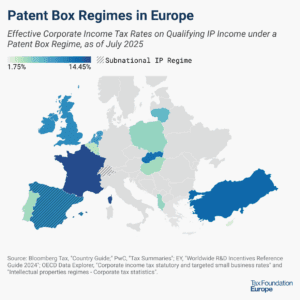
This is the third case study in a series on territorial tax systems in other countries. The intent of the study is to see what lessons the U.S. can learn from other countries’ experiences and to evaluate the validity of some of the fears critics express when discussing what would result if the U.S. were to move to a territorial system.
“Let it be heard clearly around the world—from Shanghai to Seattle, and from Stuttgart to Sao Paolo: Britain is open for business.” —Chancellor George Osborne, 2011[1]
 Like Japan, the United Kingdom’s international taxA tax is a mandatory payment or charge collected by local, state, and national governments from individuals or businesses to cover the costs of general government services, goods, and activities.
system looked very similar to the U.S. model until very recently. Whereas Japan was primarily concerned with the trapped foreign earnings problem, the UK was more concerned with issues directly related to its firms’ competitiveness. In 2006, Her Majesty’s Treasury opened talks with business leaders with the express purpose of developing a more competitive international tax system. Though competitiveness remained the chief aim of tax reform throughout the process, other motivations included steep compliance costs and ineffective anti-avoidance measures of the older system.[2]
Like Japan, the United Kingdom’s international taxA tax is a mandatory payment or charge collected by local, state, and national governments from individuals or businesses to cover the costs of general government services, goods, and activities.
system looked very similar to the U.S. model until very recently. Whereas Japan was primarily concerned with the trapped foreign earnings problem, the UK was more concerned with issues directly related to its firms’ competitiveness. In 2006, Her Majesty’s Treasury opened talks with business leaders with the express purpose of developing a more competitive international tax system. Though competitiveness remained the chief aim of tax reform throughout the process, other motivations included steep compliance costs and ineffective anti-avoidance measures of the older system.[2]
In 2008, a string of business emigrations prompted “intense discussions among lawmakers and businesses about the competitiveness of Britain’s tax system.” The New York Times described three particular outgoing firms as just part of the “exodus of British companies fleeing the tax system.”[3] This publicity breathed life into tax reform efforts, which came to fruition in 2009. In the wake of the new legislation, the Financial Times reported that more than half of companies had considered leaving the UK but that the “exodus has slowed down, partly because of Treasury reforms.”[4]
 The UK system now features a full exemption for various classes of foreign-source dividends[5] and allows domestic tax deductions for foreign-source expenses, similar to most other territorial systems. Among key anti-avoidance measures are limits on the deductibility of interest payments (“thin capitalization rules,” as described for Japan), rules that enforce tax on controlled foreign affiliates based in low-tax jurisdictions (where effective tax rates are less than three-quarters of corresponding UK liability), and regulations which qualify diverted intellectual property income as taxable. To provide favorable treatment to intangible property income and guard against the outflow of intangible property, the UK operates a “patent boxA patent box—also referred to as intellectual property (IP) regime—taxes business income earned from IP at a rate below the statutory corporate income tax rate, aiming to encourage local research and development. Many patent boxes around the world have undergone substantial reforms due to profit shifting concerns.
” regime that lowers the tax to just 10 percent on profits attributed to qualifying patents.[6] While the system is already comparatively generous to foreign income, UK officials have announced intentions to narrow their controlled foreign company rules to target only profits artificially diverted from the UK.[7]
The UK system now features a full exemption for various classes of foreign-source dividends[5] and allows domestic tax deductions for foreign-source expenses, similar to most other territorial systems. Among key anti-avoidance measures are limits on the deductibility of interest payments (“thin capitalization rules,” as described for Japan), rules that enforce tax on controlled foreign affiliates based in low-tax jurisdictions (where effective tax rates are less than three-quarters of corresponding UK liability), and regulations which qualify diverted intellectual property income as taxable. To provide favorable treatment to intangible property income and guard against the outflow of intangible property, the UK operates a “patent boxA patent box—also referred to as intellectual property (IP) regime—taxes business income earned from IP at a rate below the statutory corporate income tax rate, aiming to encourage local research and development. Many patent boxes around the world have undergone substantial reforms due to profit shifting concerns.
” regime that lowers the tax to just 10 percent on profits attributed to qualifying patents.[6] While the system is already comparatively generous to foreign income, UK officials have announced intentions to narrow their controlled foreign company rules to target only profits artificially diverted from the UK.[7]
For the 2011 budget, Chancellor George Osborne proclaimed that the highest ambitions for the British economy were to “have the most competitive tax system in the G20,” and “be the best place in Europe to start, finance and grow a business.”[8] Along with tax rate reductions, the transition to a territorial system has served British ambitions. Within days of the announcement, two of the twenty-two recently inverted companies announced that they would consider a move back to the UK.[9]
Data
 According to the OECD, the unemployment rate ticked up slightly in 2010 and 2011, rising to meet the OECD average (Figure 1, above). However, if we look closer at the latest data from the British government, we see that unemployment has generally leveled off since the July 2009 policy change (Figure 2, above).[10] The worsening Euro crisis has stalled economic growth for the UK and its trading partners, but labor outcomes in the UK have not appreciably deteriorated since the inception of territorial treatment of foreign income.
According to the OECD, the unemployment rate ticked up slightly in 2010 and 2011, rising to meet the OECD average (Figure 1, above). However, if we look closer at the latest data from the British government, we see that unemployment has generally leveled off since the July 2009 policy change (Figure 2, above).[10] The worsening Euro crisis has stalled economic growth for the UK and its trading partners, but labor outcomes in the UK have not appreciably deteriorated since the inception of territorial treatment of foreign income.
Since the policy change in 2009, corporate tax receipts have increased despite a tax rate cut in 2011 (Figure 3). Again, this is not to suggest that the territorial system caused the revenue increase—particularly because the policy change was concurrent with GDP growth recovery. Nonetheless, revenue has only increased since the transition to territorial taxation. OECD statistics on revenue as a share of GDP also confirm that it increased in 2010, the first year after the policy changed, in line with the OECD trend (Figure 4).[11]
While outbound FDI as a share of GDP picked up slightly in 2011, just surpassing the total OECD figure[12] (not shown), it does not appear that the infant territorial system in the UK has created problems for British workers or government coffers. Again, the popular fears about territorial taxation have not come to fruition in the case of the UK.
[1] Budget 2011: Chancellor George Osborne’s speech in full, The Telegraph, Mar. 23, 2011, http://www.telegraph.co.uk/finance/budget/8401022/Budget-2011-Chancellor-George-Osbornes-speech-in-full.html.
[2] See Kevin S. Markle, A Comparison of the Tax-motivated Income Shifting of Multinationals in Territorial and Worldwide Countries (Oxford University Centre for Business Taxation, Working Paper 12/06, Nov. 2010), at note 7, http://eureka.bodleian.ox.ac.uk/3199/1/WP_12_06.pdf.
[3] Julia Werdigier, British Companies Emigrating Over Taxes, New York Times, Sept. 4, 2008, http://www.nytimes.com/2008/09/05/business/worldbusiness/05tax.html.
[4] Vanessa Houlder, Taxation risks business exodus, Financial Times, Dec. 7, 2009, http://www.ft.com/intl/cms/s/0/6c6da6e0-e2d1-11de-b028-00144feab49a.html#axzz1z1G87HG6. From 2007 to 2010, a total of 22 companies inverted out of the UK. See Martin A. Sullivan, Eaton Migrates to Ireland: Will the U.S. Now Go Territorial?, 135 Tax Notes 1303 (June 11, 2012).
[5] For qualifications for exemption, see Joint Committee on Taxation, Background and Selected Issues Related to the U.S. International Tax System and Systems that Exempt Foreign Business Income (May 20, 2011), at 42, http://www.jct.gov/publications.html?func=startdown&id=2793.
[6] Id. at 44-46.
[7] Id. at 44.
[8] Budget 2011: Chancellor George Osborne’s speech in full, The Telegraph, Mar. 23, 2011, http://www.telegraph.co.uk/finance/budget/8401022/Budget-2011-Chancellor-George-Osbornes-speech-in-full.html.
[9] Steve McGrath & Alistair MacDonald, WPP, Publisher Weigh End to Tax Exile From U.K., Wall Street Journal, Mar. 25, 2011, http://online.wsj.com/article/SB10001424052748704425804576220142365862996.html. See also Jill Treanor, Budget 2011: Corporation tax cut may woo businesses back from abroad, The Guardian, Mar. 23, 2011, http://www.guardian.co.uk/uk/2011/mar/23/corporation-tax-business-back-abroad.
[10] UK Office for National Statistics, Labour Market Statistics, March 2012, UK Office for National Statistics Statistical Bulletin (Mar. 14, 2012), http://www.ons.gov.uk/ons/dcp171778_260033.pdf. Historic data pulled from previous years’ March bulletins. See UK Office for National Statistics, All releases of Regional Labour Market Statistics, http://www.ons.gov.uk/ons/publications/all-releases.html?definition=tcm%3A77-21859.
[11] OECD statistics differ slightly from official UK government statistics because of differences between the fiscal year and the calendar year (OECD reports calendar year).
[12] OECD, Foreign Direct Investment Statistics, http://www.oecd.org/daf/internationalinvestment/investmentstatisticsandanalysis/foreigndirectinvestmentfdistatistics-oecddataanalysisandforecasts.htm (updated July 27, 2012).
Share this article




